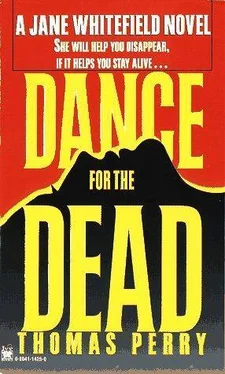Thomas Perry - Dance for the Dead
Здесь есть возможность читать онлайн «Thomas Perry - Dance for the Dead» весь текст электронной книги совершенно бесплатно (целиком полную версию без сокращений). В некоторых случаях можно слушать аудио, скачать через торрент в формате fb2 и присутствует краткое содержание. Жанр: Старинная литература, на английском языке. Описание произведения, (предисловие) а так же отзывы посетителей доступны на портале библиотеки ЛибКат.
- Название:Dance for the Dead
- Автор:
- Жанр:
- Год:неизвестен
- ISBN:нет данных
- Рейтинг книги:4 / 5. Голосов: 1
-
Избранное:Добавить в избранное
- Отзывы:
-
Ваша оценка:
- 80
- 1
- 2
- 3
- 4
- 5
Dance for the Dead: краткое содержание, описание и аннотация
Предлагаем к чтению аннотацию, описание, краткое содержание или предисловие (зависит от того, что написал сам автор книги «Dance for the Dead»). Если вы не нашли необходимую информацию о книге — напишите в комментариях, мы постараемся отыскать её.
Dance for the Dead — читать онлайн бесплатно полную книгу (весь текст) целиком
Ниже представлен текст книги, разбитый по страницам. Система сохранения места последней прочитанной страницы, позволяет с удобством читать онлайн бесплатно книгу «Dance for the Dead», без необходимости каждый раз заново искать на чём Вы остановились. Поставьте закладку, и сможете в любой момент перейти на страницу, на которой закончили чтение.
Интервал:
Закладка:
She climbed the old varnished staircase and walked into her bedroom. The telephone answering machine glowed with a steady, unblinking zero. She stripped off the clothes she had been wearing since she had left Michigan, stuffed them into the laundry bag she kept in her closet, then walked into the bathroom. She ran the water so that it cascaded into the tub hot, turned the air steamy, and condensed on the mirrors.
She stepped into the tub and let the water rise until it was close to the rim, then turned it off, leaned back, and closed her eyes. She had slept very little for the past few days, waiting until Mary Perkins was settled and breathing deep, regular breaths before she stood up, moved a chair to the best window, and sat watching the street outside the motel. Whenever she had begun to doze off, she had found herself sinking into a dream about Timothy Phillips.
She sat up, washed her hair, then lay back down and submerged her head to let the hot water soak away the shampoo and sting the bruises and abrasions on her cheek and jaw. She held her breath for a minute and a half, hearing the old, hollow sound of the pipes, feeling her hair floating up around her face and shoulders like a cloud of soft seaweed. Then she slowly lifted her head above the surface and arched her back to let the long, heavy hair hang down her back, draining along her spine. She lay back to feel the water cleaning every part of her body, slowly dissolving away the feeling of dirt, like a stain, that she always felt when she had been locked in a jail. The showers they had in jails could never wash it out. It had to come off in water she found outside.
Jane stayed in the water until it was cold, and then got out and dried herself gingerly with a big, thick towel, wrapped it around her, and brushed out her hair. Her skin was tender now, as though all of her pores had opened and the grime of the trip had been taken away, and then beneath that, a whole layer of skin cells had come off. She felt new.
She put on a clean gray sweatshirt, some soft faded blue jeans, and white socks, then lay on her bed facing the ceiling, her arms away from her body. She consciously relaxed each muscle, first her feet, ankles, calves, knees, thighs, then her fingers, hands, wrists, forearms, biceps, then her back muscles one pair at a time, from the waist to the shoulders, and fell asleep.
Jake Reinert raked the leaves in his back yard and put them into a new bushel basket. The problem with planting trees when you were young was that the damned things got bigger and more vigorous while you got older and stiffer, until you found one day that you were too old to pick up all the leaves. His problem was worse than most, because his grandfather had planted the one over his head right now. It was absurd to keep picking up sycamore leaves, but it was the first task that had presented itself while he was looking for a way to keep himself from thinking about Jane. The problem was that raking took so little thought that he kept coming back to her.
He remembered the day he had started worrying full-time, when Jane was ten or eleven. Jake had been working in the chemical plant up in the Falls. It was good money for those days, but it was heavy and hard, and the danger of it was constant. There were caustic chemicals that would have to be poured from the big vats a few times each day, and tiny droplets might hit your overalls without your noticing it. By the end of the shift there would be men in the shop whose clothes were already disintegrating, with pinholes through their pants and shirts that were getting big enough to meet each other. In those days nobody said much about it because this was a part of the country where most people worked in the heat of open-hearth steel mills, risked their limbs beside drop-forges or hydraulic presses, or worked in the lumberyards, where anything that made a noise had the capacity to cut you in two.
There were a number of Indian fellows in the part of the plant where Jake worked. There were a few Tuscaroras from the reservation in Lewiston, two or three Mohawks who came over the Rainbow Bridge before dawn every morning from Brantsford, Ontario, and four Senecas - two from Cattaraugus and two from Tonawanda. They were always playing practical jokes on each other and shouting across the shop in their languages and then laughing. At lunchtime they all sat around one of the long workbenches that was covered with butcher paper and played as many hands of euchre as they could in half an hour, slapping cards down so fast that sometimes it was hard to see them. There were about ten in the shop but only eight played, so there were two games going at a time. They made tally marks on the butcher paper to keep score. Euchre usually went to ten, but they played to a hundred.
Jake had watched them for his first couple of shifts on the job when one day he heard an enormous roar of laughter. One of their interminable games had ended. The two losers sat in their places looking as solemn and wooden as any movie fan would have liked. The two winners stood over them and gleefully flipped the cards against their noses while everybody else pointed and laughed. If the loser was caught laughing or even let a muscle of his face change, the penalty was doubled. Jake didn't need to have it explained to him. They were playing for Nosey, just like kids had when he was growing up. Later, after he knew them better, they had corrected him. The name of the game was some Indian word - they all sounded like "yadadadadadada" to him. So he said, "What's it mean?" and one of them thought for a second, and then said, "Nosey."
They accepted Jake without appearing to notice that they had, and during the summer, when people took their vacation time, he would be the one they asked to sit in for the absent player. One late July he had sat down with his lunch and eyed the tally marks on the butcher paper, pretty certain that if he and his partner, Doyle Winthrop, didn't get lucky this was their day to go home with red noses. Or redder, in Doyle's case.
One of the Mohawks came in from the loading dock looking grim. He talked to two of the others in low tones and then one of the others talked to three more on the other end of the shop. Finally Doyle Winthrop looked back at the bench, stared at Jake for a moment, and then came to sit down.
Doyle leaned on his elbows across the table, stared directly into Jake's eyes, and said, "You were a friend of Henry Whitefield's, weren't you?"
After that the details didn't much matter, but Jake listened to them anyway. Henry was an ironworker. He had been part of a gang, all of them Iroquois, who had been out west someplace building a big bridge. Doyle said a cable that was holding the girder Henry was walking on had snapped, and down went Henry. Theirs was the generation that had fought in Europe and the Pacific, and the memory of it hadn't gotten hazy in the few years since. The Iroquois Confederacy had officially and independently declared war on Germany, and all of this little band that had somehow come to include Jake Reinert had seen friends blown apart by heavy weapons. They were all acquainted with the feeling, but none of them spoke again that day.
Jake had gone home early and found his wife, Margaret, already next door with Jane and her mother. Over the years after that he had tried to be helpful, but they weren't the sort of women who needed much help. Jane had been good at schoolwork, and had never had the sort of critical shortage of boys that would have required a fatherly man to come over and tell her the story of the ugly duckling. She managed to get herself a scholarship to Cornell and apparently did whatever they required of her, because they gave her a diploma at the end of it.
Jake had only begun to worry about Jane in earnest again a year or so after that, when her mother died. Here she was a young, strikingly attractive girl with a college degree and the whole world out there waiting for her. She came back, moved into the old house next door, and lived there all alone. She had always held jobs in the summers when she was home from school, but now, as nearly as he could tell, her movements weren't regular enough to accommodate any job he had ever heard of. She was not merely secretive about what she did, she was opaque.
Читать дальшеИнтервал:
Закладка:
Похожие книги на «Dance for the Dead»
Представляем Вашему вниманию похожие книги на «Dance for the Dead» списком для выбора. Мы отобрали схожую по названию и смыслу литературу в надежде предоставить читателям больше вариантов отыскать новые, интересные, ещё непрочитанные произведения.
Обсуждение, отзывы о книге «Dance for the Dead» и просто собственные мнения читателей. Оставьте ваши комментарии, напишите, что Вы думаете о произведении, его смысле или главных героях. Укажите что конкретно понравилось, а что нет, и почему Вы так считаете.












